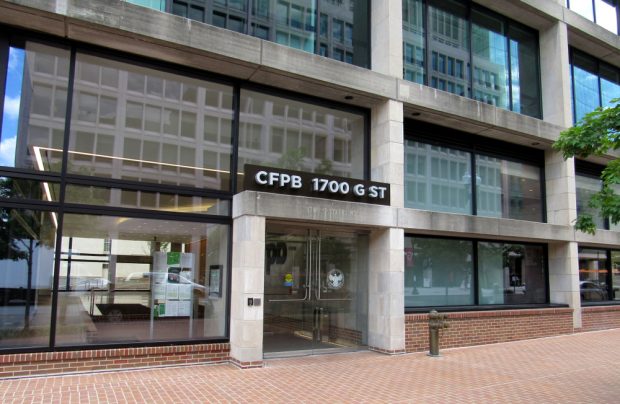 Entrance to the CFPB headquarters. (Source: Shutterstock)
Entrance to the CFPB headquarters. (Source: Shutterstock)
The four people appointed Thursday to the CFPB's Task Force on Federal Consumer Protection Law have one thing in common: They don't like the agency's work or organization.
In announcing the appointment of four people to the CFPB's Task Force on Federal Consumer Financial Law, Director Kathy Kraninger said she wants the task force to conduct a thorough study of the current regulatory framework and how to improve it.
Recommended For You
That won't happen with the current membership, one consumer advocate said.
"It's shocking that Consumer Financial Protection Bureau Director Kraninger didn't even appoint a token pro-consumer person to this sham taskforce," said Lauren Saunders, associate director of the National Consumer Law Center. "The members have a track record of opposing consumer protection regulations. The CFPB should not be convening a task force to write the industry lobbyists' report to gut consumer protection laws. Whatever recommendations made are likely to be biased and to carry water for large financial corporate interests."
Some consumer advocates on Thursday seized on the appointment of Todd Zywicki as chairman of the task force.
Zywicki had been mentioned as a possible agency director early in the Trump Administration and he has been bluntly critical of it.
"The tragedy of Dodd-Frank and the CFPB is that it squandered [the] unprecedented opportunity to modernize the consumer credit system to promote competition, consumer choice, and innovation," Zywicki told the Senate Banking Committee in April 2016. Zywicki is a law professor at the Antonin Scalia School of Law at George Mason University,
The three other members of the task force have espoused similar views:
Thomas Durkin
A retired senior economist at the Federal Reserve Board, Durkin wrote a book with Zywicki called "Consumer Credit and the American Economy."
The two also co-authored a commentary in Forbes Magazine in 2014 in which the they implied that if payday lending were too strictly regulated, borrowers would turn to loan sharks.
"While well-designed regulation can improve competition and consumer choice, economic history demonstrates that heavy-handed regulations that restrict product offerings frequently harm their intended beneficiaries," they wrote.
They said that if you eliminate legal-high cost options, borrowers will still find loans.
And they cited Anthony "Fat Tony" Salerno's indictment for loan-sharking charges in 1973. When Salerno was charged, it was estimated that his operation had some $80 million in outstanding loans.
And the co-authors strongly criticized the Dodd-Frank Act and the creation of the CFPB.
"As Dodd-Frank, the Consumer Financial Protection Bureau, and other regulations pile their weight upon the economy, consumers have been systematically driven out of the mainstream financial system and into high-cost alternatives or lose credit altogether," they wrote.
J. Howard Beals III
Beals is a former professor of strategic management and public policy at the George Washington University and former director of the Bureau of Consumer Protection at the Federal Trade Commission.
Beals has criticized tight regulations of the payday loan industry. Under President Obama, CFPB Director Richard Cordray pushed an aggressive payday loan rule. The Trump Administration has been loosening the rule.
Beals agrees that a strict rule would harm people who need short-term loans.
"Regulation imposing an upper limit on payment-to-income ratio is likely to result in reduced access to credit for a large majority of current borrowers, without a large improvement in loan payoff rates," he and co-author Anand Goel wrote in a 2015 study of short-term loans.
Beals also has called on the CFPB to define the meaning of "abusive," in regard to the agency's powers to take action in cases of Unfair, Deceptive or Abusive Acts or Practices.
L. Jean Noonan
A partner at the law firm of Hudson Cook, Noonan wrote on the firm's website that the creation of the CFPB created an unnecessary division between large and small institutions.
She wrote, for instance, the CFPB had to hire compliance examiners who likely already had jobs at other federal agencies.
"I think our biggest banks should have the most seasoned and most qualified consumer compliance examiners, and I bet consumer advocates agree with me. But, by and large, this is not what's happening," she wrote.
And she too criticized the structure of the bureau, saying that it should be governed by a commission.
© 2025 ALM Global, LLC, All Rights Reserved. Request academic re-use from www.copyright.com. All other uses, submit a request to [email protected]. For more information visit Asset & Logo Licensing.







